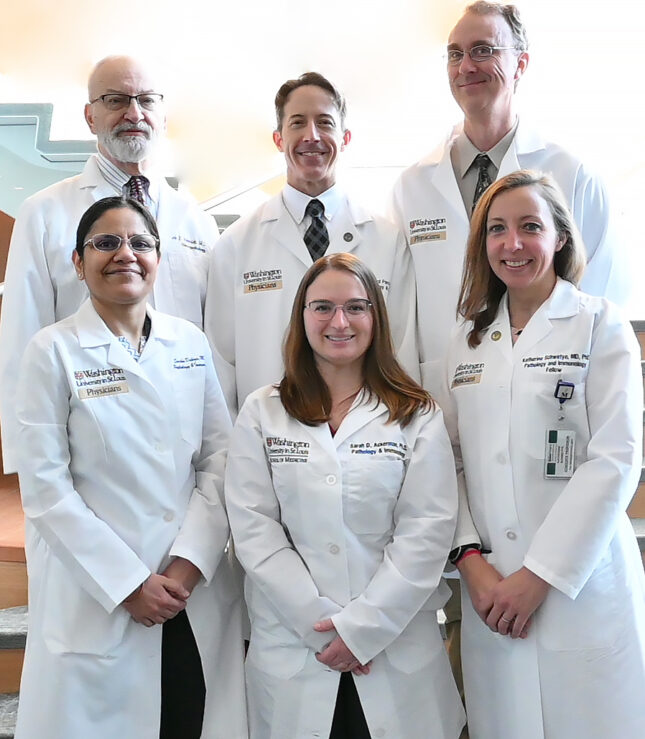
Division chief: Robert Schmidt, MD, PhD
The Division of Neuropathology is committed to the advancement of the clinical practice of diagnostic neuropathology by its integration with modern techniques and insights gleaned from new developments in basic molecular neuroscience research.
Neuropathology is a highly specialized, yet remarkably broad field of study. The innate complexity of the brain and the number of diseases that affect the central and peripheral nervous systems is daunting. Nevertheless, there has never been a more exciting time to practice within this field, as exploding technologic advances allow us to address critical questions in ways that were never possible even a few years ago.
Collaborative research opportunities
The research involvement of our faculty is equally active and includes virtually all aspects of basic, translational and clinical studies, often in association with members of other departments at Washington University, as well as numerous national and international collaborations.
Areas of Neuropathology faculty research interest are widely varied. They include translational research involving the identification of molecular genetic markers associated with tumorigenesis, malignant progression and biologic behavior of central and peripheral nervous system tumors (Sonika Dahiya, MD).
We have a longstanding interest in the investigation of the mechanisms of neuropathy involving the peripheral nervous system in clinical and experimental settings (Robert Schmidt, MD, PhD).
The laboratory of Sarah Ackerman, PhD uses both zebrafish and fruit fly model systems to determine how distinct glial cell populations (individually and collectively) instruct nervous system development and disease, from synapses to circuits.
The laboratory of Joseph Corbo, MD, PhD is interested in a systems-level understanding of the development, diseases and function of photoreceptors, and to leverage the developmental and spectral plasticity of these cells to treat blindness.
A major focus is neurodegenerative disease (Richard Perrin, MD, PhD and John Morris, MD) conducted in collaboration with the Washington University Alzheimers’s Disease Research Center, an internationally known resource of pathologically and clinically characterized human subjects, and involving molecular characterization of pathogenetic mechanisms using transgenic mouse models. As a result, we form an integral part of the vibrant, diverse and widespread neurobiology research community drawn from the Departments of Neurology, Neurosurgery, Neuroscience, Psychiatry and Developmental Biology.
Broad range of training
Katherine Schwetye, MD, PhD, leads our Neuropathology Fellowship program. At least one teaching conference is held each day of the week (except Friday), with General Pathology residents, Neuropathology fellows, Pediatric Pathology fellows and rotating residents from Neurology, Neurosurgery and/or Neuroradiology. There is also a glass slide teaching set within the division that includes hundreds of cases of all types that can be reviewed under the microscope by medical students, residents and fellows who rotate through our service.
Learn more about residency and clinical fellowship programs, and see a list of our past trainees.
Highly active clinical services
The clinical service is extremely active and includes everything from “bread and butter” neuropathology to the rarest of entities. We take pride in providing unsurpassed diagnostic and molecular diagnostic services, fulfilling both the local needs at Barnes-Jewish Hospital and St. Louis Children’s Hospital, as well as many other centers around the world via our consultation service.
Additional resources
- Neuromuscular Disease Center
- Alzheimer’s Disease Research Center
- Faculty expertise: Neuropathology
- “The Washington University Experience” – A Neuropathology Atlas
Division contact information
Billie Charlton
Division Administrator
314-273-1742
billie.charlton@wustl.edu
Robert E. Schmidt, MD, PhD
Director, Division of Neuropathology
Phone: 314-362-7429
Email: reschmidt@wustl.edu
Mailing address:
Division of Neuropathology
Department of Pathology and Immunology
660 South Euclid Avenue
Campus Box 8118
St. Louis, MO 63110
Street address:
BJC Institute of Health (BJCIH) Building
425 South Euclid Avenue
3rd floor, Room 3407
St. Louis, MO 63110